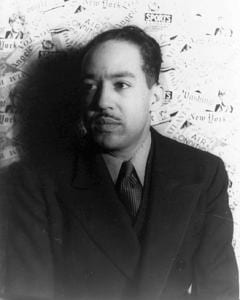Consider the power of language to liberate or brutalize. We can all learn from one of America’s greatest poets: Langston Hughes.
Uncle Tom
Within—The beaten pride.
Without—The grinning face,
The low, obsequious,
Double bow,
The sly and servile grace
Of one the white folks
Long ago
Taught well
To know his Place.
Language does not, cannot, always mean what the dictionary says. A word may seem servile, but within, coded for other people to hear, the speaker is still proud. He may be beaten, but he is still a man. The dictionary may only account for the use of the powerful, the tyrants. A mass of people may develop more sly meanings.
A great evil of systematic racism is when it forces good men to submit to evil men for the sake of family and survival. Pride can be beaten down and language becomes coded. Everyone gets the “joke” but the tyrant. The oppressed understand what is being said with the “double bow,” but the rulers do not. These systems have existed in oppressive cultures from Selma to Stalingrad. Is this double meaning good? What should a person do in such circumstances?
I am not fit to judge. A great man, a Frederick Douglass, rises up and speaks the truth. Others take a different course and if it is not quite right, it is not quite wrong either.
The coded language of “the sly and servile grace” for anyone “taught well to know his place” means that history and context will always matter. We cannot just turn to dictionaries of common usages as these are often written for the common usage of those with power. They want to believe that the “grinning face” is real and miss much of the meaning of the double bow. The meaning is at least this: if you have taught a man to know any place other than the role of a full image bearer of God, then you have done a very wicked thing. If a tyrant succeeds in making a man obsequious, then this is a sure sign of his evil. There is no escape from it.
The tyrant also may miss the sly new uses of language, not captured in technical dictionaries, made by the oppressed. Context and history matter. This is why some of us can never say some things, use some terms, without being wrong, because to others what “we mean” is not enough. There is context to other people, other sons and daughters of God, from which there is no escape. The powerful, or those that think they have power, wish this were not so, but it is so.
We must listen to how another person uses a term. All of us must grasp that the best dictionary may miss the way some group of people, not studied by dictionary makers, use terms. Yet even if the dictionaries were perfect, capturing every usage, the multiple ways a term can be used requires utmost clarity. This is especially true when terms have been used to oppress.
An Example of Missing Context
Langston Hughes makes this obvious in his poetry, but I see this in debates all the time.
Once I interrupted a discussion where a person who did not use English as his primary language was being battered by a critic. The discussion turned on the use of terms like “animal” and “faith.” These are terms with several different standard meanings and also technical definitions in different fields of study. In some contexts, they also occur fraught with difficulty based on history. For example, some have used “animal” to dehumanize people of other races. In a context of race differences, the resistance to one definition of animal was not just about which dictionary to use. The critic was missing important linguistic and historical context he was enacting with the student.
Obviously, all humans are animals in the scientific sense. No educated Christian denies that all people are mammals in that context.
However, “an animal” also can refer to some mammal that is not rational, not human: “someone who behaves in a brutal or bestial manner.” This secondary meaning has been applied to other “races.” As a result, when a Christian from a particular background resents or pushes back on being called an animal, or merely an animal, there is a context and history to that resistance. He or she might be resisting one meaning without denying the other, because the term has been greatly misused. No person, no human, is merely a beast and certainly is not bestial by nature. We are more than mere animals in that context.
Definitions matter, but so does understanding what is meant or what terms have been forced to mean. When people were taught to “jump Jim Crow,” then certain dances, words, and images, harmless in themselves, became the means to put down an entire people group. When a man or woman said: “Yes, sir,” then “Yes, sir” could carry a sub-text of defiance. The powerful might hear “Go down Moses” as about only the Exodus of Jewish people, while the singer might be pining for an end to systematic racism.
The refusal to recognize context, or the history of usage, is a dangerous error.
We cannot take the words “literally,” when they are being used at the end of a particular history with a “sly and servile grace.” If we insist on our own definitions, refusing to see how words might be used differently, then we might, if we have the cultural or educational power, beat down people’s pride to agree with us. We should also not be shocked if our “victory” indicates a profound defeat.
—————————–
 *Hughes, Langston. Selected Poems of Langston Hughes (Vintage Classics) (p. 160). Knopf Doubleday Publishing Group. Kindle Edition.
*Hughes, Langston. Selected Poems of Langston Hughes (Vintage Classics) (p. 160). Knopf Doubleday Publishing Group. Kindle Edition.
Langston Hughes is my favorite American poet . . . since fifth grade! (This was one of the few things to come from that no-good year.) He always is worth reading.











